
Dana Goldman, Petros Ioannou and Peter Kuhn (top row, from left) are USC’s new University Professors. The new Distinguished Professors are (bottom row, from left) Ricky Bluthenthal, Sofia Gruskin, Surya Prakash and Gale Sinatra.
USC names 7 faculty members University Professors and Distinguished Professors
The titles recognize faculty members who are leaders in their research fields.
Seven faculty members who are leaders in their respective research fields have been appointed University Professors and Distinguished Professors, an honor granted each year to a select group of academics at USC.
“These exceptional faculty members have brought unparalleled prestige and acclaim to USC with their work,” said Andrew T. Guzman, provost and senior vice president for academic affairs. “Their research contributions go far beyond campus and have made real material changes to society. It’s exciting to get to honor such an esteemed group of people.”
The title of University Professor is selectively awarded based on multidisciplinary interests and significant accomplishments in several disciplines. The university selectively awards the Distinguished Professor title to those whose accomplishments have brought special renown to USC.
USC’s new class of University Professors
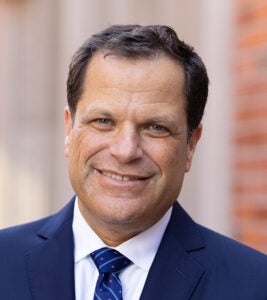
A professor of public policy, pharmacy and economics, Dana Goldman is also dean of the USC Price School of Public Policy. Since coming to USC in 2009, Goldman has focused on economics and finance; health policy; health care reform; pharmaceutical regulation and innovation; and precision medicine. Goldman is also the founding director of the USC Leonard D. Schaeffer Center for Health Policy & Economics, a research hub for USC Price and the USC Alfred E. Mann School of Pharmacy and Pharmaceutical Sciences. Goldman will step down as dean of USC Price on July 1 to become the first director of the new USC Leonard D. Schaeffer Institute for Public Policy & Government Service.
Goldman earned the title of Distinguished Professor at USC in 2016 and has since co-edited a book and published 65 journal articles and book chapters. He’s authored more than 300 articles in total across the disciplines of medicine, health policy, economics and statistics.
Goldman received the Associates Award for Creativity in Research at USC, was named inaugural associate member for the Center for the Economics of Human Development, and has been made a member of the National Academy of Social Insurance and fellow of the National Academy of Public Administration.
Outside of USC, Goldman is a founding co-editor of the Forum for Health Economics & Health Policy, and serves on the editorial boards of Health Affairs and the American Journal of Managed Care.
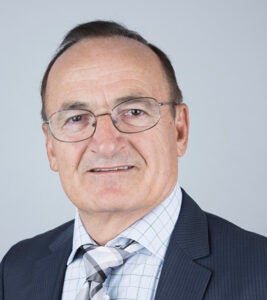
Petros Ioannou is a professor of electrical, computer, aerospace and mechanical engineering. For over 40 years, his research has expanded upon robust adaptive control and its application to transportation and logistical systems — i.e., creating intelligent methods for improved traffic flow and driver safety.
Since 1992, Ioannou has served as director of the Center for Advanced Transportation Technologies at the USC Viterbi School of Engineering. He has also served on the executive committee of the METRANS Transportation Consortium, a joint effort of USC and California State University, Long Beach, since 1999. Ioannou also helped launch and began directing the USC Viterbi master’s program in financial engineering — one of the most successful programs at the school — in collaboration with the USC Marshall School of Business.
Ioannou has published nine books, more than 170 journal articles and book chapters, and nearly 250 conference papers. At USC, he has taught and developed 20 courses and graduated 40 doctoral students. Ioannou was recently inducted into the National Academy of Engineering and made a fellow of the European Academy of Sciences. He is also a member of the Academia Europaea and a fellow of the National Academy of Inventors.
Outside of USC, Ioannou has served as editor-in-chief of IEEE Transactions on Intelligent Transportation Systems and as vice president for publications and on the board of governors of the ITS Society.

Peter Kuhn — a professor of biological sciences, medicine, biomedical engineering, aerospace and mechanical engineering, and urology — has taught at USC since 2014. His research focuses on cancer evolution from its earliest moments to its lethal metastatic stage, developing models and tool sets for personalized patient treatment. Kuhn’s teachings and research span three schools: the USC Dornsife College of Letters, Arts and Sciences; the Keck School of Medicine of USC; and USC Viterbi.
In addition to serving as the founding director of the Convergent Science Institute in Cancer within the USC Michelson Center for Convergent Bioscience, Kuhn founded Epic Sciences Inc. in 2009 to develop cancer diagnostic products. He’s also a member of the USC Innovation Council and has served on the USC Restart and Keck Medicine of USC COVID-19 Response committees, while being an active member of the USC Norris Comprehensive Cancer Center and serving on an internal advisory committee for Children’s Hospital Los Angeles. Earlier this week, he was named a senior member of the National Academy of Inventors.
As a physicist and entrepreneur who has established translational science programs at multiple institutions, Kuhn spent 12 years at The Scripps Research Institute in La Jolla before coming to USC. There, he brought together scientists from engineering and medicine to work on cancer in the human body.
With three patents, 16 patent applications licensed for commercialization and 270 peer-reviewed articles published, Kuhn’s grant portfolio averages $5 million per year and over $150 million over the last 20 years, includes funding from the Department of Defense and the National Institutes of Health, as well as other foundations.
USC’s newest Distinguished Professors
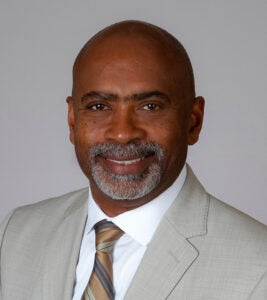
Ricky Bluthenthal is the associate dean for social justice and a professor in the department of population and public health sciences at the Keck School of Medicine.
His expertise resides at the convergence of clinical psychology, sociology, harm reduction and community-based behavioral interventions to mitigate health disparities. Bluthenthal’s current research — funded by the Centers for Disease Control and Prevention, the National Institute on Drug Abuse, the National Institute on Alcohol Abuse and Alcoholism, the National Institute on Minority Health and Health Disparities, and the Robert Wood Johnson Foundation — includes both qualitative and quantitative research examining the impact of intensive case management for unhoused people who inject drugs.
In his role as associate dean for social justice, Bluthenthal leads the Keck School of Medicine’s Justice through Equity, Diversity, Inclusion, Well-being and Social Transformation — JEDI-WeST — program, a $2 million investment that empowers faculty, staff and students to build an inclusive culture. Bluthenthal was also appointed associate director for USC’s Institute for Addiction Science and as vice chair for diversity, equity and inclusion in his department.
Bluthenthal — who has worked at USC since 2012 — has authored or co-authored roughly 180 manuscripts in peer-reviewed scientific journals and serves on the editorial boards of the International Journal of Drug Policy, Drug and Alcohol Dependence, and Annals of Medicine.
His awards include the Senior Scholar Award from the Drugs and Society Section of the American Sociological Association and the Distinguished Scientific Contributions to Public Interest Award from the Society of Addiction Psychology of the American Psychological Association.

Sofia Gruskin’s expertise spans three schools across the university: the Keck School of Medicine, the USC Gould School of Law and USC Dornsife. Gruskin is a professor of population and public health sciences and law, as well as the director of the USC Institute on Inequalities in Global Health, and her research involves broad health and human rights challenges including HIV and sexual and reproductive health, child and adolescent health, gender-based violence, and noncommunicable disease.
In her role as director of the Institute on Inequalities in Global Health, Gruskin has been invited to speak internationally about global health more than 100 times. She has served on the board of directors for the Guttmacher Institute among many other organizations, and on over two dozen advisory committees for the United Nations, where she has evaluated global HIV/AIDS programs and the health and human rights of women, children and adolescents, and other vulnerable populations. Gruskin also served as editor-in-chief for Health and Human Rights and as associate editor for the American Journal of Public Health for over 15 years, and remains an associate editor with Sexual and Reproductive Health Matters, and with Global Public Health.
In her career to date, Gruskin has published 160 peer-reviewed articles, 38 book chapters, co-edited four books, completed 81 research grants, and served on more than 20 thesis committees. She came to USC from Harvard in 2011, where she was an associate professor, served as director of their Program on International Health and Human Rights and was co-founder and co-director of the Interdepartmental Program on Women, Gender and Health. Since coming to USC, she is the primary convener of the USC Law & Global Health Collaboration, sits on the USC Academic Senate Executive Board and has partnered with the L.A. Mayor’s Office of International Affairs.
Her awards include the United Nations Global Citizen Award and the Max Hayman Award from the Global Alliance for Behavioral Health and Social Justice.
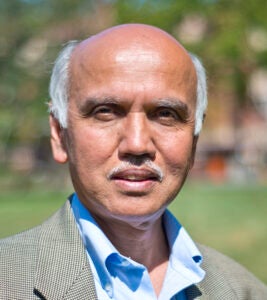
Surya Prakash has worked at USC since 1981 as a professor of chemistry and chemical engineering and materials science at both USC Dornsife and USC Viterbi. He also holds the George A. and Judith A. Olah Nobel Laureate Chair in Hydrocarbon Chemistry. For more than a decade, Prakash has served as director of the USC Loker Hydrocarbon Research Institute. His research innovations have led to fundamental breakthroughs in the areas of fossil fuel alternatives, energy storage for batteries, carbon capture and recycling technologies.
Outside of USC, Prakash is a member of the European Academy of Sciences, a fellow of the American Chemical Society, a foreign fellow of the Indian Academy of Sciences and a fellow of the American Association for the Advancement of Science.
With more than 830 peer-reviewed scientific papers and 14 books published — while also holding 119 patents — Prakash has won numerous awards, including three American Chemical Society awards in Fluorine, Hydrocarbon and Organic Chemistry, and the Tolman Medal. In 2013, Prakash shared the inaugural $1 million Eric and Sheila Samson Prime Minister’s Prize for Innovation in Alternative Fuels for Transportation with the late George Olah, a noted USC chemist who won the Nobel Prize in Chemistry in 1994.
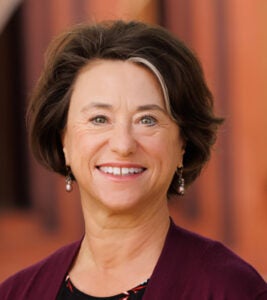
Gale Sinatra has worked as a professor of education and psychology at both the USC Rossier School of Education and USC Dornsife since 2011. She serves as the associate dean for research at USC Rossier and serves as a project co-lead at the USC Center for Generative AI and Society. Sinatra’s work focuses on educational psychology, including the cognitive, motivational and emotional processes that lead to attitude change, conceptual change and successful learning in STEM disciplines. Her research has garnered 14 grants, including four from the National Science Foundation, and in 2022 she was elected as a member of the National Academy of Education.
Outside of USC, Sinatra is an American Educational Research Association fellow and American Psychological Association fellow, and recently served as the president of the American Psychological Association Division 15. She previously held the role of elected vice president of Division C in the American Educational Research Association, and from 2021 to 2022, served as chair of the APA Climate Change Task Force.
With some 90 peer-reviewed articles, 24 book chapters and four books published, Sinatra has received numerous awards, including the Division C Sylvia Scribner Award from the American Educational Research Association.



